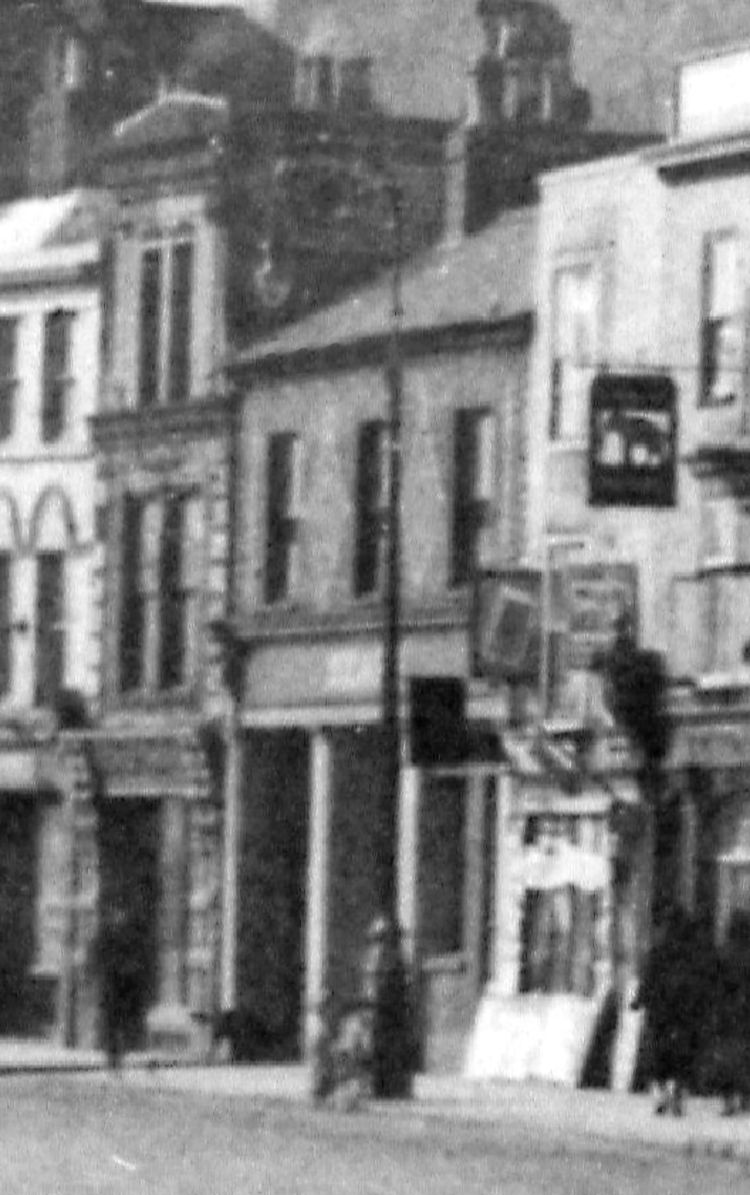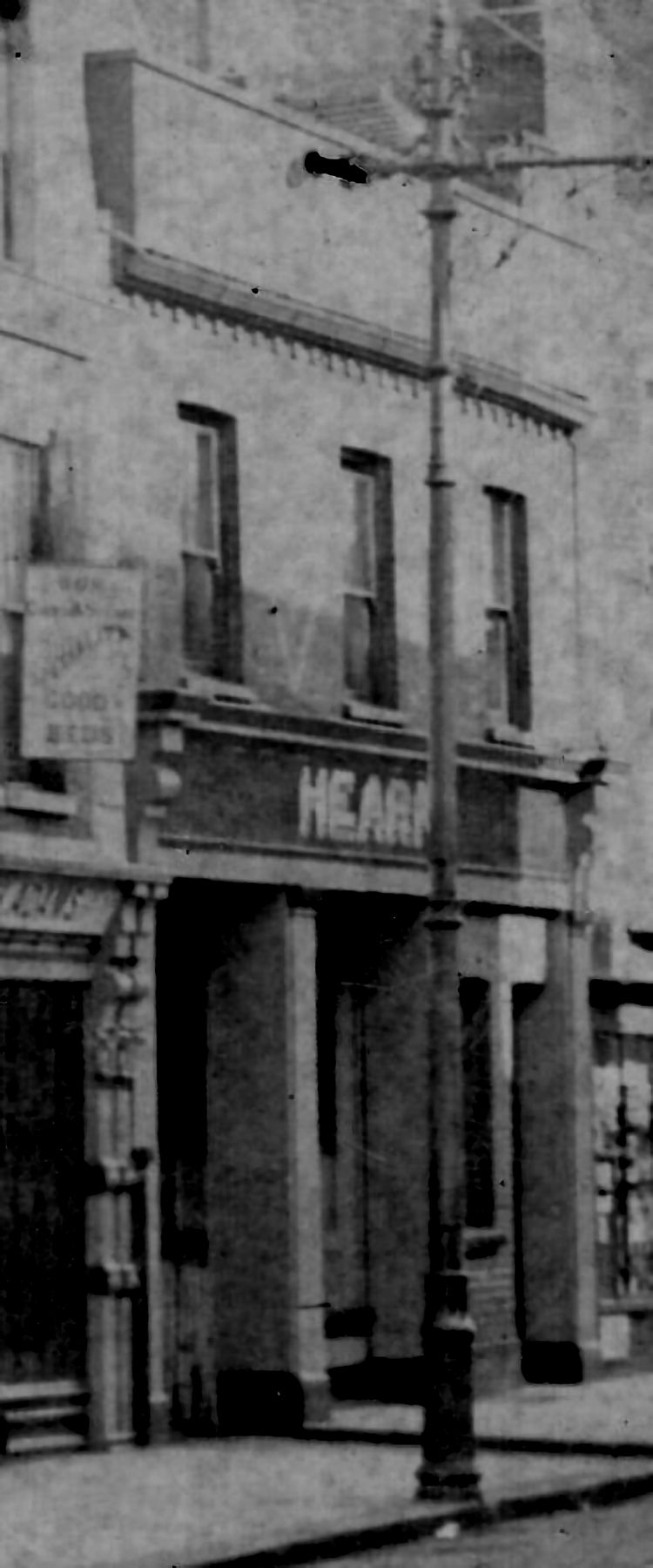|
117 Snargate Street
Dover

Above photo, date unknown, next door to the "York House" at 115 on
the right, sign shown. |

Above photo, date unknown, as Herns. The building was destroyed in WW2. |
Chapman in 1805. Open in 1851 but the renewal refused in 1869. Although Dane managed to
open later that year the licence was refused again in 1870.
August 1863 an inquest was held at the public house of the death of
Edward Wildish Junior due to injuries sustained by accidental scolding, the
inquest attached no blame to any person. The 1861 census showed the house to
be occupied by Edward Wildish and his wife Mary Ann, 32 and 33 respectively,
their daughter Mary Jane aged 2, and single lodger Thomas Petley aged 37,
and single niece, Mary Ann Eastland, age 17. No mention of Edward Wildish
Junior at that time, so upon his untimely death I guess he was under 2 years
of age.
|
From the Dover Express and East Kent Intelligencer, 9 August, 1862.
AN UNLAWFUL WEAPON
An Irish labourer names Patrick Doughtney, who lives at Durham Hill,
and has formerly been in the army, was brought up by police-constable
Russell for having threatened to stab two or three artillerymen on the
previous evening.
It appeared that the soldiers were at the "Two Brothers" public house
in Snargate Street, on the preceding evening, about eight o'clock, when
the prisoner entered the bar, and made some offensive remarks upon the
artillery service generally, for the sake, apparently, of picking a
quarrel. His remarks were not responded to, and he then pulled from
under his coat a long-bladed knife, similar to the weapons used by the
hill tribes of India for the purpose of warfare, and brandishing it
declared he would stab the first artilleryman he came near. He then left
the public-house, when two or three of the soldiers he had insulted
followed him, and one of their number succeeded in getting the knife
away from him. The weapon was produced. It was about two feet long, and
about two inches in breadth at the haft, from which it gradually
narrowed to a point. Altogether it was a most formidable looking
instrument and on its being produced an exclamation of horror escaped
from several persons in the court.
The prisoner entreated the Magistrates to deal leniently with him,
assuring them that his threats were uttered while he was under the
influence of drink, and that he had no intention whatever of carrying
them out.
One of the artillerymen who was put under examination was asked if he
went in fear of the prisoner. He replied, with profound contempt, that
he should not fear a dozen men who could carry about with them so
cowardly a weapon as the knife produced. He had thought it right to take
it away from him, least he might do mischief with it, fearing him was
out of the question.
The prisoner said that he was quite willing that the knife should be
taken away by the police and destroyed. He had had it for seven years,
having purchased it at Trinidad, previous to coming home from the West
Indies. What induced him to take it out with him the previous day, he
did not know; but he supposed he was drunk and was unconscious of what
he was about.
On the police being asked if anything was known of the prisoner,
Sergeant Geddes replied that he knew the prisoner to have been
previously engaged in a row in which fatal consequences were narrowly
escaped, the prisoner having broken a soldier's head with a poker. The
man who was injured lay ill for some time, and it was once thought that
he would not recover. The prisoner was not charged then, as the regiment
to which the man who was hurt belonged was just on the point of leaving
Dover.
After a consultation between the Magistrates, the Mayor said the
excuse offered by the prisoner, that he was drunk, could not be regarded
by the Bench as any excuse whatsoever. He had been found in the
possession of an unlawful weapon, and it was fortunate perhaps that it
was taken away from him before he did any serious mischief with it. He
would not be permitted to have it again. The Magistrates would direct it
to be impounded, and in addition the prisoner must enter into his own
recognizance's of twenty pounds to keep the peace.
Doughtney at once entered into the required bond, and paid the
expenses, apparently very happy to get out of an awkward scrape on terms
so easy.
|
|
Dover Telegraph and Cinque Ports General Advertiser, Saturday 26 September 1863.
September 223, at Snargate Street, Dover, Mr. Edward Wildish, landlord
of the "Two Brothers," ages 35
years.
|
|
From the Dover Express and East Kent
News, Friday 16 April, 1869.
INFRINGEMENT OF PUBLIC HOUSE LICENSES
John George Dane, the landlord of the "Two Brothers," another
public-house in Snargate Street, was charged with having his house open
contrary to the statute on Sunday last, and also with harbouring
prostitutes in his house.
Police-sergeant Johnson said he was on duty in Snargate Street, at
twenty minutes to one o'clock on Monday morning, when he saw that the
"Two Brothers" was lighted up. He found the constable on the beat and in
his company visited the house. After some difficulty they obtained
admission, and witness then found a party of four men and three
prostitutes drinking in the tap-room. On drawing the landlords attention
to the fact, he said the people were lodgers with exception of one, who
then rose and left the house. he visited the house a second time in ten
minutes afterwards and found two of the men still there; but the women
had gone to bed in the house.
Police-constable Pilcher corroborated the statement of Johnson.
The defendant, in reply to the charge said that his house was a
lodging-house, and that the beds in the house being full he and some of
the lodgers were sitting up. The beer seen on the table was supplied
before the prohibited hour. He (defendant) had not been in the
town long, and did not know prostitutes from "substitutes".
He called, Henry Fox, who said he was at the "Two Brothers" early on
Monday morning. He gave evidence substantiating the defendant's
statement, and accounted for his own presence in the house by stating
that he was a friend of the defendant's waiter, and was staying to
accompany him home, as he frequently did. Witness had never seen the
women in the house before, and, as to the beer, it was brought into the
room before eleven o'clock. Nobody was supplied with drink after eleven.
By the Bench: I am occasionally employed in the house.
The defendant said he had no other witnesses, but they could only
"spin the same yarn."
The magistrates dismissed the charge of drawing beer, but convicted
the defendant ion the second charge , and fined him 10s. and 10s.
6d. costs.
|
|
Whitstable Times and Herne Bay Herald, 30 July 1870.
KEEPING A DISORDERLY HOUSE.
George Dane was indicted for keeping a disorderly house and harbouring
prostitutes at the "Two Brothers" public-house, Snargate Street, on the
12th of May, 1870.
Mr. Barrow, instructed by Mr. P. B. Claris, prosecuted; and in opening
the proceeding stated it was a prosecution instituted by the Parish
Authorities. He wished the prisoner had been represented by counsel, as
then he would have had the wholesome advice given him to plead guilty
and throw himself on the mercy of the Court, for the case he had to lay
before them was a very clear one.
In answer to the Recorder, the prisoner said that he had left the house
altogether and gone to Faversham. It belonged to Mr. Tritton, a brewer
of Ash.
The Recorder thought that the man had better have pleaded guilty.
The prisoner then said he would plead guilty.
Mr. Carrow said he was instructed to say that the Parish Authorities did
not wish to punish the man severely, but only to prevent the repetition
of the nuisance. He might add that since the Magistrates refused the
licence of the house, it had been very badly conducted, and it was owing
to this.
The prisoner said he had been at sea, and did not know of the disorderly
conduct, nor was it allowed by his consent. The police had exaggerated
the case.
The Recorder stated that he should pass no sentence, but merely bind the
prisoner over in his own recognizances of £40, and one surety of £20 to
appear whenever called upon. If the conduct was not repeated nothing
more would be heard of the matter.
|
|
From the Dover Express and East Kent Intelligencer, 16 September, 1870. Price 1d.
THE ANNUAL LICENSING DAY
FRESH APPLICATIONS
The applications of Henry Amos, for the “Two Brothers” was refused.
|
LICENSEE LIST
CHAPMAN 1805
WANDBY/WAUDBY Matthew 1847+
 
TRIM D 1851
WILDISH Edward 1861-63+
License transfer (unknown) July/1867

DANE John George 1869-70+

AMOS Henry Sept/1870 (License refused)
 From Bagshaw Directory 1847 From Bagshaw Directory 1847
 From the Dover Telegraph From the Dover Telegraph
 Whitstable Times
and Herne Bay Herald Whitstable Times
and Herne Bay Herald
|

